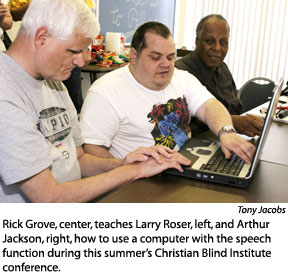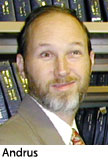By Paula Schlueter Ross
Lutheran Church–Missouri Synod congregations now sponsor 31 Outreach Centers for the Blind, and 10 more centers are poised to open later this year, according to Rev. Dave Andrus, executive director of Lutheran Blind Mission, an LCMS mission society based in St. Louis.
That’s good news, but hardly unexpected, since the society’s mission plan calls for a total of 60 such centers by the end of 2006, and 75 the following year.
The really good news, says Andrus, is that the Synod is reaching more blind people with the Gospel than ever before. Each center draws about 25 blind and vision-impaired people a year, according to Andrus, so that’s a total of 750 people this year alone. And most of them, he says, are hearing the Gospel for the first time.
If a congregation has one or more blind members, starting an “outreach center” is a “good opportunity for us to work together to reach into the community to other blind people,” Andrus said. “Because blind people know where other blind people are — they have that natural connection. And because 95 percent of blind people are unchurched, it’s not only a wonderful opportunity to touch a life but to share the Gospel.”
Deaconess Martha Moser, director of the Victory Christian Outreach Center for the Blind located at Holy Cross Lutheran Church in Philadelphia, said most of the 20 or so people who come to her cente r are like the vast majority of blind people — they’re unemployed and they rarely leave their homes.
r are like the vast majority of blind people — they’re unemployed and they rarely leave their homes.
The outreach center gets them out, introduces them to other blind and low-vision people, and exposes them to the Gospel — all worthwhile endeavors, she says. The Philadelphia outreach center offers free computer training, braille instruction, and Bible studies. And, thanks to a cooperative arrangement with a local food bank, the center sends participants home with free bags of groceries, which can be a godsend to those without jobs.
Moser, who is losing her sight because of a progressive eye disease, is the first graduate of the Christian Blind Institute, an LCMS-related work-from-home course that trains blind people to serve as deacons, deaconesses, evangelists, and Christian care-givers. Started in 1999 by Lutheran Blind Mission, the institute offers braille and audio courses on topics such as Law and Gospel, the catechism, how to lead a small group, counseling, and family relationships.
Moser, who said she has attended lots of different churches in her 64 years, said the classes taught her that “everything that I have is because of the grace of God and His mercy” and not because of anything she herself has done. Just as “the Lord opened the door in a miraculous way” to her through The Lutheran Church–Missouri Synod, the church body can — and should — reach out to others in the blind community, she said.
blind community, she said.
Andrus encourages LCMS congregations with even one blind member to see that member as a link to others. Almost all of the Synod’s 31 outreach centers for the blind are sponsored by LCMS congregations, he said, which often brings new members to the church.
But adding to church membership rolls isn’t the goal of outreach centers, he added: “Our goal is to show human care and compassion so that [blind and visually-impaired people] might know that people care, which opens up the door to talk about a loving God who cares.”
For more information about blind ministry, including resources, contact Lutheran Blind Mission toll-free at (888) 215-2455 or visit its Web site.
Posted Sept. 23, 2005




